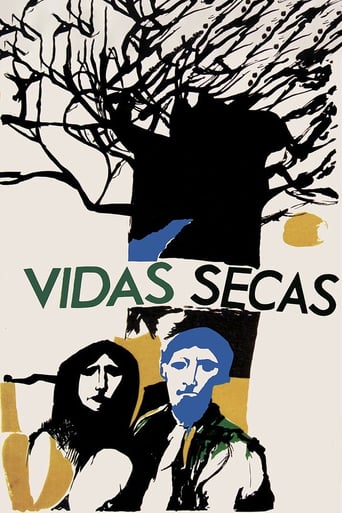
At the beginning of the 1960’s, in Brazil, there appeared a cinema movement created by left wing, young intellectual filmmakers called, “Cinema Novo”. The filmmakers of this movement were struck by the immense suffering of the majority of the population in their homeland. These filmmakers had the most limited of budgets and in many cases had to make use of simple hand-held cameras. Within this period and creativity emerged a stirring film that highlighted everything that, “Cinema Novo”, represented. Directed by Nelson Pereira dos Santos, who would become one of Brazil’s most renowned directors, the film was, “Vidas Secas”, or “Barren Lives”.
Situated in the desert landscapes of the 1940’s Northeast Brazil, the movie visualizes the life of a typical poverty stricken family. The family consists of Fabiano, his wife Maria and their two young sons. There is also a mangy but devoted dog. The movie opens as the family slowly trudges forward on foot with all of their belongings in an unfocused, white and unattractive landscape. The only noise heard is an irritating scratching rumble, that we find out later, is the noise of a horse driven buggy. Fabiano works where he can find work and there is a terrible drought happening. They arrive at an abandoned shack of a local landowner, who allows them to stay if Fabiano agrees to work as a ranch hand for a pittance. Fabiano and his family represents the countless poor like him in Brazil, not only in the 40’s, but also during the time the film was made in the 60s. In addition of having to work in harsh conditions for slave wages, Fabiano has those wages cheated down by his boss, has the local Government attempt to tax him of the little he has left, and is beaten mercilessly by the police. Even the local church is shown helping and abiding the oppressors. There is no pity or compassion in his life. He takes it all in with screams of pain, tears and anger that are nearly silent. Maria is more communicative about their situation and complains incessantly. Then there are the children, who watch as their parents constantly feel pain in a life that is lacking in any joy. At one point one of the sons asks Maria what is Hell, and after receiving the well-known religious response, comes to a realization that hell is no different than his own life. Their dog is loved by the children and gives them the only true expression of love they have in their lives.
This is not a movie where love conquers all. The grainy black and white hand held visuals of this extremely low budget film only enhanced the grimness and feeling of despair. This is not a movie to watch while feeling down. In fact, it may ruin any good mood you may have. What it is, is a powerful movie that has something important to say about society and the need for compassion.

